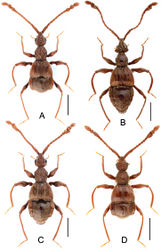Labomimus vespertilio
| Notice: | This page is derived from the original publication listed below, whose author(s) should always be credited. Further contributors may edit and improve the content of this page and, consequently, need to be credited as well (see page history). Any assessment of factual correctness requires a careful review of the original article as well as of subsequent contributions.
If you are uncertain whether your planned contribution is correct or not, we suggest that you use the associated discussion page instead of editing the page directly. This page should be cited as follows (rationale):
Citation formats to copy and paste
BibTeX: @article{Yin2012ZooKeys251, RIS/ Endnote: TY - JOUR Wikipedia/ Citizendium: <ref name="Yin2012ZooKeys251">{{Citation See also the citation download page at the journal. |
Ordo: Coleoptera
Familia: Staphylinidae
Genus: Labomimus
Name
Labomimus vespertilio Yin & Li sp. n. – Wikispecies link – ZooBank link – Pensoft Profile
Type material
(2 ♂♂, 5 ♀♀). Holotype: ♂, labeled ‘CHINA: Yunnan, Dali Bai Aut. Pref., / mount. range E Weishan, 12 km NE / Weishan, 25°17'02-15"N, 100°22' / 22-30"E, 2630-2660 m, scrub with / pines and bamboo, litter sifted, 15.IX. / 2009. leg. M. Schülke [CH09-54]’ (cSch). Paratypes: 1 ♂, 5 ♀♀, same label data as holotype (cSch, SNUC).
Diagnosis
Reddish brown; length 3.34–3.52; postgenae nearly rounded; antennomeres IX–XI enlarged, VIII–X modified in the male; pronotum with lateral margins moderately angularly expanded laterally; with short blunt metaventral processes; metacoxae spinose; aedeagus with symmetric median lobe.
Description
Male (Fig. 6C). Length 3.34–3.52. Head longer than wide, HL 0.70–0.75, HW 0.63–0.65; eyes each composed of about 30 facets. Antennal clubs as in Fig. 9A. Pronotum (Fig. 9B) slightly longer than wide, PL 0.71–0.74, PW 0.65–0.70, with lateral margins moderately angularly expanded laterally. Elytra wider than long, EL 0.75–0.81, EW 1.23–1.28. Short metaventral processes with rounded apices (Fig. 9C). Protrochanters with small ventral spine, profemora with large ventral spine (Fig. 9D), protibiae with distinct apical tubercle (Fig. 9E); mesotrochanters (Fig. 9F) with tiny spine at ventral margin; metacoxae (Fig. 9G) with long hook-like protuberance at ventral margin, metatrochanters and metafemora simple. Abdomen broad at base and narrowed apically, AL 1.18–1.22, AW 1.28–1.35. Sternite IX as in Fig. 9H. Aedeagus length 0.56, with symmetric median lobe (Figs 9I–K).
Female. Similar to male in general; BL 3.34–3.40, HL 0.72–0.73, HW 0.61–0.62, PL 0.72–0.73, PW 0.68–0.70, EL 0.73–0.74, EW 1.28–1.29, AL 1.17–1.20, AW 1.38–1.41. Eyes each composed of about 25 facets. Antennae lacking modification; metaventral processes absent.
Comparative notes
This is placed as a sister species of Labomimus cognatus, sharing with it a number of character states (see comparative notes under Labomimus cognatus). The two species can be separated by the larger body size, the strongly asymmetric antennomeres IX, and the aedeagus with much broader apex in Labomimus vespertilio, while Labomimus cognatus is smaller in body size, has symmetric antennomeres IX with a disc-like process, and has the aedeagus with a much narrower apex. Other than the aforementioned characters, the two species also share with Labomimus sarculus the lateral rows of dense setae extending from frontal rostrum base to head base, and the three species seem toform a small species-complex. For separation of Labomimus sarculus from Labomimus cognatus and Labomimus vespertilio see the comparative notes under that species.
Distribution
Southwest China: Yunnan.
Biology
Adults were from sifted leaf litter in a scrub forest with pines and bamboo.
Etymology
The Latin word ‘vespertilio’ means ‘a bat’, referring to the bat-like apical part of the aedeagal median lobe.
Original Description
- Yin, Z; Li, L; 2012: Notes on Michael Schülke’s pselaphine collections from China. – Tyrini. I. genera Labomimus Sharp, Linan Hlaváč and Pselaphodes Westwood (Coleoptera, Staphylinidae, Pselaphinae) ZooKeys, 251: 83-118. doi
Images
|

